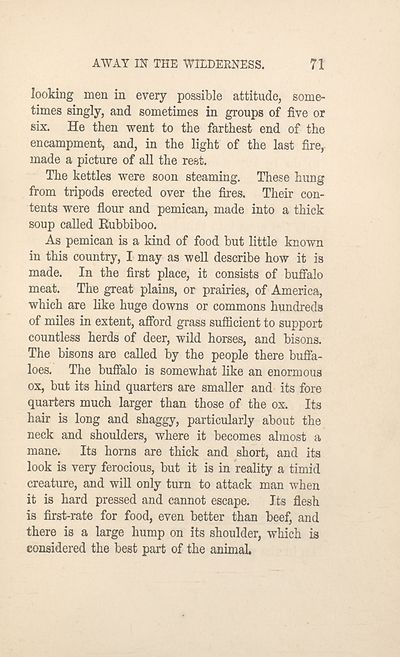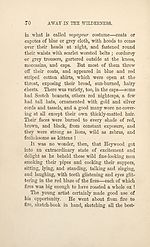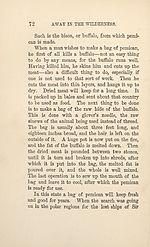Adventure and adventurers > Away in the wilderness, or, Life among the red Indians and fur-traders of North America
(83)
Download files
Complete book:
Individual page:
Thumbnail gallery: Grid view | List view

AWAY m THE WILDERNESS.
71
looking men in every possible attitude, some¬
times singly, and sometimes in groups of five or
six. He then went to the farthest end of the
encampment, and, in the light of the last fire,
made a picture of all the rest.
The kettles were soon steaming. These hung
from tripods erected over the fires. Their con¬
tents were flour and pemican, made into a thick
soup called Rubbiboo.
As pemican is a kind of food but little known
in this country, I may as well describe how it is
made. In the first place, it consists of buffalo
meat. The great plains, or prairies, of America,
which are like huge downs or commons hundreds
of miles in extent, afford grass sufficient to support
countless herds of deer, wild horses, and bisons.
The bisons are called by the people there buffa¬
loes. The buffalo is somewhat like an enormous
ox, but its hind quarters are smaller and its fore
quarters much larger than those of the ox. Its
hair is long and shaggy, particularly about the
neck and shoulders, where it becomes almost a
mane. Its horns are thick and short, and its
look is very ferocious, but it is in reality a timid
creature, and will only turn to attack man when
it is hard pressed and cannot escape. Its flesh
is first-rate for food, even better than beef, and
there is a large hump on its shoulder, which is
considered the best part of the animal
71
looking men in every possible attitude, some¬
times singly, and sometimes in groups of five or
six. He then went to the farthest end of the
encampment, and, in the light of the last fire,
made a picture of all the rest.
The kettles were soon steaming. These hung
from tripods erected over the fires. Their con¬
tents were flour and pemican, made into a thick
soup called Rubbiboo.
As pemican is a kind of food but little known
in this country, I may as well describe how it is
made. In the first place, it consists of buffalo
meat. The great plains, or prairies, of America,
which are like huge downs or commons hundreds
of miles in extent, afford grass sufficient to support
countless herds of deer, wild horses, and bisons.
The bisons are called by the people there buffa¬
loes. The buffalo is somewhat like an enormous
ox, but its hind quarters are smaller and its fore
quarters much larger than those of the ox. Its
hair is long and shaggy, particularly about the
neck and shoulders, where it becomes almost a
mane. Its horns are thick and short, and its
look is very ferocious, but it is in reality a timid
creature, and will only turn to attack man when
it is hard pressed and cannot escape. Its flesh
is first-rate for food, even better than beef, and
there is a large hump on its shoulder, which is
considered the best part of the animal
Set display mode to:
![]() Universal Viewer |
Universal Viewer | ![]() Mirador |
Large image | Transcription
Mirador |
Large image | Transcription
| Antiquarian books of Scotland > Adventure and adventurers > Away in the wilderness, or, Life among the red Indians and fur-traders of North America > (83) |
|---|
| Permanent URL | https://digital.nls.uk/136973945 |
|---|
| Description | Thousands of printed books from the Antiquarian Books of Scotland collection which dates from 1641 to the 1980s. The collection consists of 14,800 books which were published in Scotland or have a Scottish connection, e.g. through the author, printer or owner. Subjects covered include sport, education, diseases, adventure, occupations, Jacobites, politics and religion. Among the 29 languages represented are English, Gaelic, Italian, French, Russian and Swedish. |
|---|

